Written by Jenn Hand, Holistic Nutritionist, Board Certified Health Coach, NBC-HWC
Overcoming the Binge and Restrict Cycle
If you search “how to stop the binge and restrict cycle,” Google gives you over 4.4 million entries in just under 4 seconds.
That means there is A LOT of information to sort through to understand what would actually help. I’ve compiled the most useful information that has helped both my clients and me in one place for you to help you move forward and know where to focus 🙂
The 3 Main Causes of the Binge and Restrict Cycle
1. Dieting i.e. Not Eating Enough
When we diet, we restrict calories and typically deprive ourselves of calories, fuel and/or the foods we deem “bad.”
Our bodies need a certain level of fuel. Even if we are sitting on the couch all day, our body is burning calories to circulate blood, beat our heart, and run all the systems of our bodies. So if we are caught up in the sneaky diet mindset or trying to adhere to a specific plan (or calorie count), it ends up backfiring.
Not eating enough typically ends up causing us to overeat. This can happen at night after a day of low-calorie eating or after a few days of “good” eating. Over time, it can lead to spikes of hunger and a ravenous appetite (since our bodies need fuel and we don’t give it enough!), and may end up in a binge.
The body eventually rebels and wants MORE fuel.
When we’re not eating enough, it can feel almost impossible to use willpower or discipline since we are essentially trying to override our body’s natural signal for fuel. Dieting in any form is usually one of the main causes of a binge.
2. Psychological Reasons
Stress, boredom, anxiety, depression, and hard emotions can all be a trigger to bingeing.
Eating can be a way for us to numb out, distract ourselves and deal with the challenges that life throws at us. Typically, those of us who’ve struggled with food grew up learning that food was a way to deal with life.
We don’t learn how to move through difficult feelings, express our wants/needs, and deal with the hardship that life can throw our way. So as adults, this pattern has become ingrained in us.
And as we grow, life gets harder.
We have more obligations, responsibilities, and financial worries. We need to navigate the challenges of relationships, parenting, a career and the ups and downs of life.
Food becomes our way out and can create a pattern of bingeing.

Eating can be a way for us to numb out, distract ourselves and deal with the challenges that life throws at us.
3. A Desire for Pleasure
Sometimes when we are in the humdrum of life, we lack pleasure.
Life becomes one endless to-do list after another, with obligations, responsibilities and chores to finish. Food becomes a way to add pleasure and enjoyment to our lives.
This doesn’t always end up in a binge, but many people turn to food to add excitement, which can spiral into overeating.
Desserts, carbs and sweets add “delight” to the routine elements of raising kids, working a 9-5, taking care of a house/apartment, paying bills and managing all of life’s tasks. Often a deep desire for more pleasure, fun, adventure and enjoyment in life can manifest in a binge.
If you’d rather listen to the podcast, you can find it here:
Listen to the Cake Doesn’t Count Podcast
Here’s How I Overcame the Cycle
One of the hardest parts of this path is the “how LONG will it take?!” question.
I asked this 1800+ times over the course of my healing. The diet world trains us to expect instant results, so we come into this path with a sense of impatience.
We want “results” fast, and we want them now. The problem is, if we’ve spent years, decades or a lifetime in the diet/overeat cycle, it takes time to heal and normalize the body.
You can find the full ins and outs (with dates and how long each stage took) here.
Here’s what was key in my own healing of the binge and restrict cycle:
1. I Got Help
Early on, I convinced myself that I “shouldn’t” need help in dealing with food issues.
After all, children were starving in Africa, people dealt with serious tragedies, and the world had bigger problems. How could I wrestle with something as simple (or “dumb”) as food?
Honestly, I felt ashamed. I was embarrassed that I had no “real” problems…I had a good family, great friends, and life was good. Except I deeply struggled with food and my weight. And I couldn’t get a handle on it on my own. Admitting this was huge.
Getting help changed my life. It allowed me to shift perspective, gain clarity and make faster progress.
There are free and low-cost options like support groups, 12-step groups, sliding scale therapists, counselors that insurance covers. There are paid options like coaching, books, retreats, programs, and in-person or digital group therapies.
Truly there is no right or wrong! I did Overeaters Anonymous for many years (which was free).
I didn’t resonate with all of their principles (they promoted abstaining from sugar and flour, but I wanted to have a relationship to them, not a termination of them), but I got a sponsor and worked the steps for a bit to help me in the emotional part of it.
For a few years, I did therapy which catapulted my healing to a new level.
Both were instrumental in helping me stop bingeing and restricting. Admitting that I needed help was a huge burden lifted from my soul. Support (in whatever form that resonates with you) is the fastest way forward!

Getting help changed my life. It allowed me to shift perspective, gain clarity and make faster progress.
2. I Began with the Physical Part of Rebalancing my Body
The very first step of my healing was pairing a protein and a carb every 3-4 hours.
I focused on this for the first few months as it was crucial to getting out of the diet cycle. The most helpful part of this was that it gave my brain something to focus on. I knew I wanted to learn to listen to my body eventually, but it was so far from where I was (I was either following a diet or overeating).
I worked to eat in this way and challenge my brain when it freaked out that I would gain weight.
Like most people who get trapped in the diet world, we think that we should be dieting in order to find the control we seek. So my brain was not too happy that I was eating “so much.”
While I was working to stabilize my blood sugar and get out of the extremes of the pendulum, I also worked to retrain my thoughts so I didn’t freak out.
But the protein + carb pairing every 3-4 hours was my main focus at first; this helped to normalize my body’s rhythms so I COULD focus on some of the mental and emotional pieces.
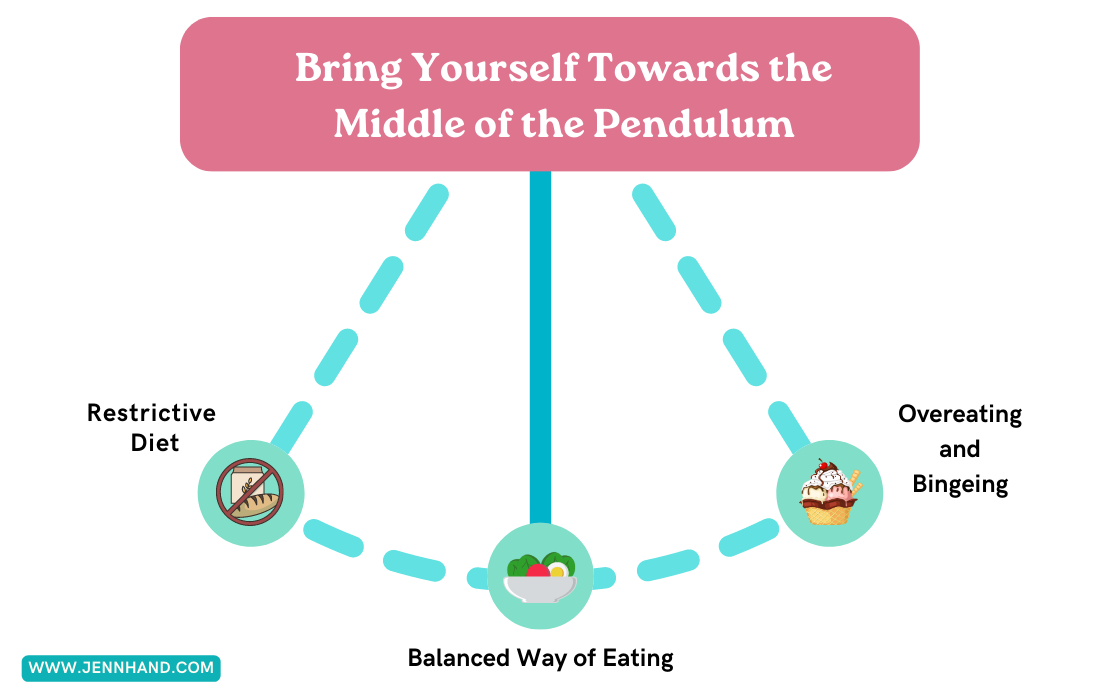
While I was working to stabilize my blood sugar and get out of the extremes of the pendulum, I also worked to retrain my thoughts so I didn’t freak out.
3. I Worked Hard to Not “Start Over”
One of the challenging parts after a binge is the immediate desire to “start over” the next day.
We feel terrible, hate ourselves for what we “did,” and are comforted by the fact that we can start over to get back on track. A diet or eating plan feels like it’s an easy answer to our problem (we feel disgusting and a diet gives us the illusion of control).
I knew that “starting over” would keep me trapped in the cycle, so I worked diligently to learn from my binges and nourish myself after so that I could resist the temptation to keep starting something new.
I wasn’t always successful, but every time I binged, I’d get out my journal, and examine what was going on that led me to the food.
My journal helped me explore what I needed to feel balanced again (I reframed “starting over” to “feeling more balanced”). I experimented with support, hydration, moving my body, meal planning, mindset & emotional work, and other things to bring me back into balance.
Working to reframe the need to start over helped me slowly but surely return to the middle of the pendulum.

My journal helped me explore what I needed to feel balanced again (I reframed “starting over” to “feeling more balanced”).
4. I Constantly Reminded Myself of Small Wins
With dieting, we expect big results.
We deprive and punish ourselves with the promise of the great reward at the end: weight loss. However, we need to take a different view of success on this path.
Looking at our small victories helps us see progress as it’s happening.
Oftentimes, we overlook the small wins because the big thing we want isn’t happening fast enough. But truly, this path IS the result of 1,000 little wins that add up to the “big” thing we want. It’s easy to gloss over expressing an emotion instead of eating, going one day without bingeing, or going out to a restaurant and being able to eat without anxiety.
We don’t think these are “big enough” things to be proud of.
But all of those wins are the start of progress over time. I worked hard to remember the small wins (especially when I wanted to give up or thought it wasn’t happening fast enough).
This kept me grounded during the ups and downs of this path.

Looking at our small victories helps us see progress as it’s happening.
⭐ RELATED POST: How do you measure results on the intuitive eating path?
5. I Didn’t Give Up
There were many many nights that I DID want to give up.
But there was always a small glimmer of hope that if I just kept going, I WOULD find freedom and become a normal eater.
The more I grew on this path, the more I knew I couldn’t go back to the world of dieting. Over time, it didn’t ring true for me anymore (and my body rebelled–I literally couldn’t last a day or two on a diet).
Deep down, I knew there was another way to eat (and live), so I stayed the course.
This sounds simple, but not easy. I got tempted to diet (and did) many times over the years. Even though I knew diets didn’t work, I still secretly tried them “one last time” to lose the weight and THEN deal with my eating issues.
Through tears and frustration, despair and thinking “I had it” (but didn’t), I kept going.
I am so glad I did, as my eating wouldn’t be where it is today if I had given up.
Applying It to Your Life: How You Can Stop the Binge and Restrict Cycle
One of my favorite mantras is “take what resonates and leave the rest”.
With everything that I write about or discuss on the podcast, if it doesn’t resonate, leave it.
If it does, take it in and make it your own. My main intention is to help you learn how to hear YOUR own guidance from within to find out what works for you. Some things may resonate, others may not.
There is no right or wrong; it is all about what works for YOU!
Here are some things to try:
1. Eat every 3-4 hours
Instead of trying to “listen to your body,” use the clock to help you reset your body.
Schedule in times to eat a meal or a snack every 3-4 hours in your day. This can help give your mind a focus and some guidance.
Whether you do better with bigger meals or smaller meals/snacks, set up your days so you are eating frequently. Use the 3-4 hour mark as a start. Experiment with what type of structure works for you: do you need to set a timer?
Do you want to do any meal planning? Would you rather be more spontaneous?
Play around with what you prefer. I was very scheduled and ate every 3 hours to the minute.
Over time, I relaxed and started to hear hunger/fullness. But in the beginning, it was 3 hours on the dot. Other people feel more relaxed and can be a bit looser. Start with what you feel comfortable with.
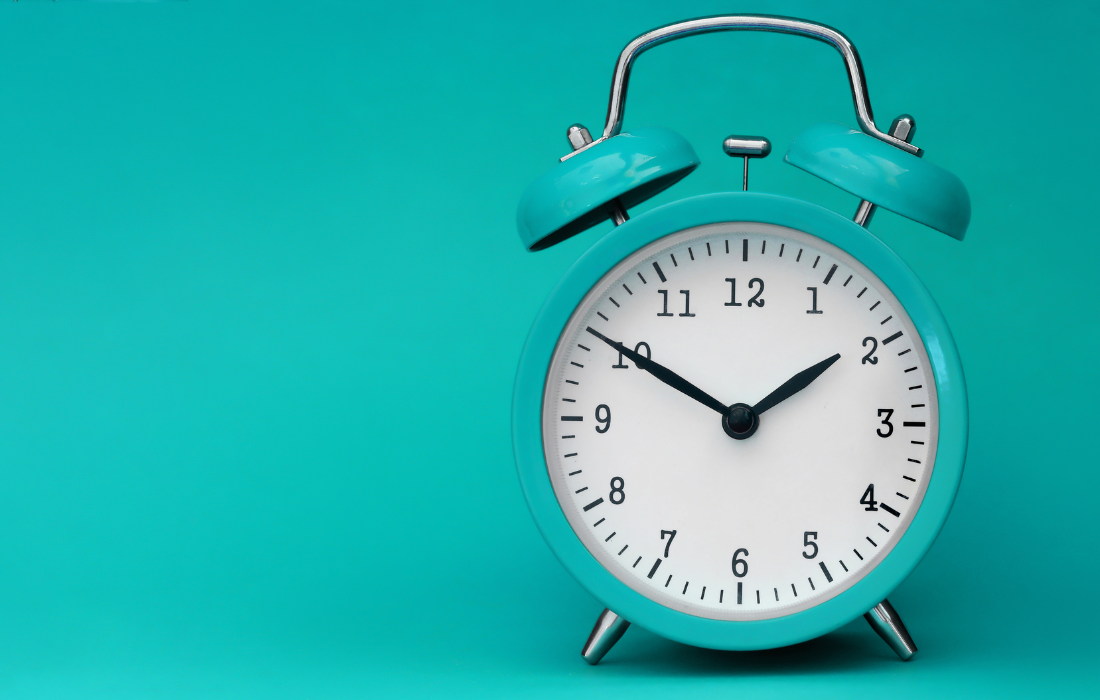
Instead of trying to “listen to your body,” use the clock to help you reset your body.
2. Examine How Much You’re Allowing vs Following Rules
When working to get out of the binge and restrict cycle, it can be confusing whether to give in to a craving or not.
The million dollar questions:
- WHAT do you eat if you’re not on a diet or not bingeing?
- Are you supposed to follow a rule or give yourself permission?
- Is it better to focus on eating what you “want” to eat and what you “should” eat?
To begin, I usually like to say do half and half.
Every time you eat, pick half of what you think you “should” eat and half of what you want to eat. For example, for lunch, your mind says, “salad with grilled chicken”. But what you really want is a piece of pepperoni pizza.
So pick half and half!
Have half a salad with chicken and one piece of pizza (or whatever combo works for you). This allows some permission mixed in with some “safety” about what you should eat.
Over time, you can refine this as you get to know your body better!
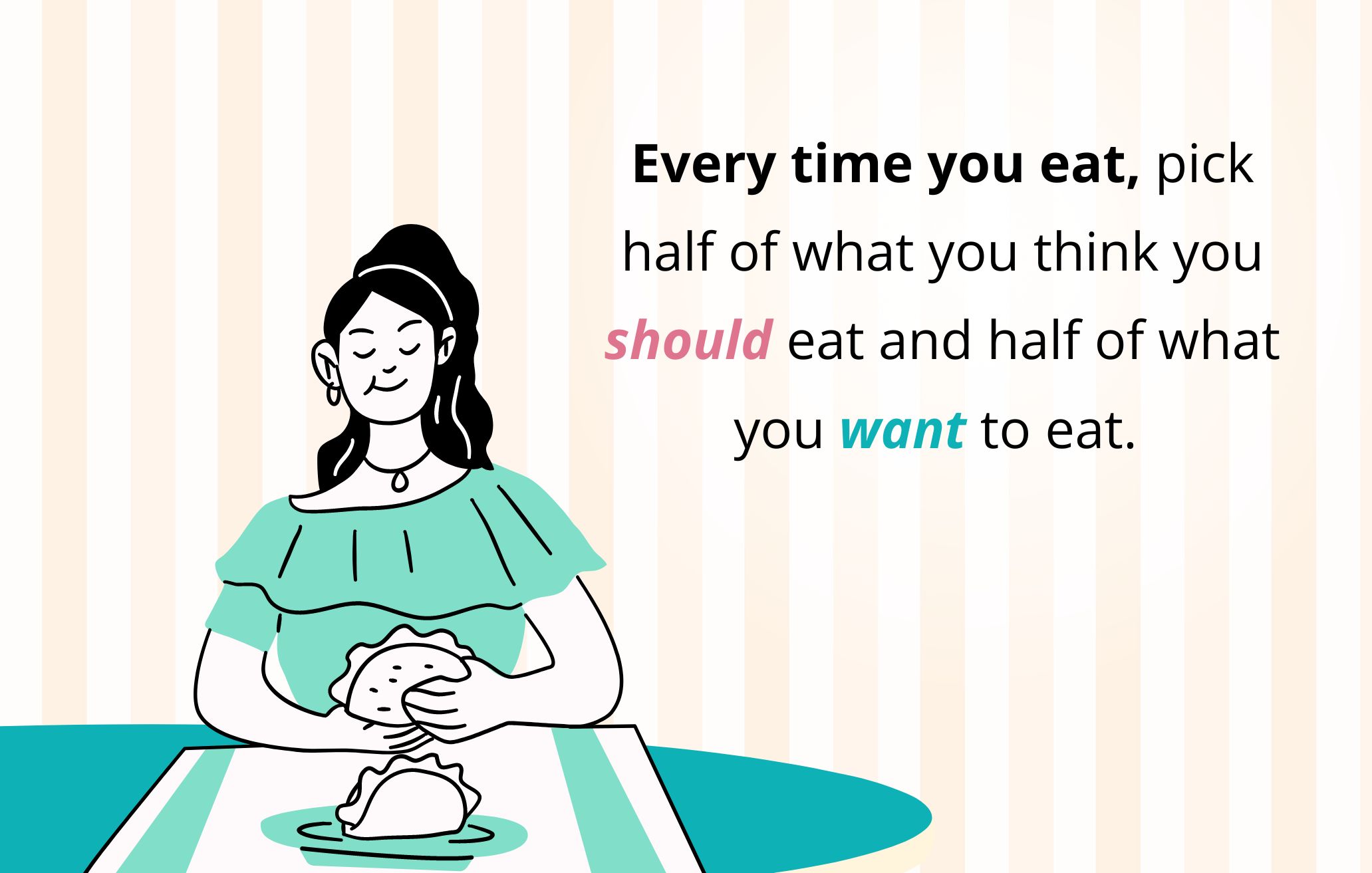
3. Work to Let Go of Labeling Food as “Good” and “Bad”
When immersed in the diet world, we learn that every food is good or bad.
The good? Vegetables, lean proteins The bad? Sugar and carbs
There are some gray areas, but not many. So when we are working to eat in a more balanced way, we struggle with those labels.
How to allow pizza when we think it’s bad?
This is where it can be helpful to soften our labels. Can you think of food not as good or bad, but as more or less energizing? Or more or less nutritious? More or less nourishing/satisfying?
Pick words that carry less baggage and judgment than good or bad.
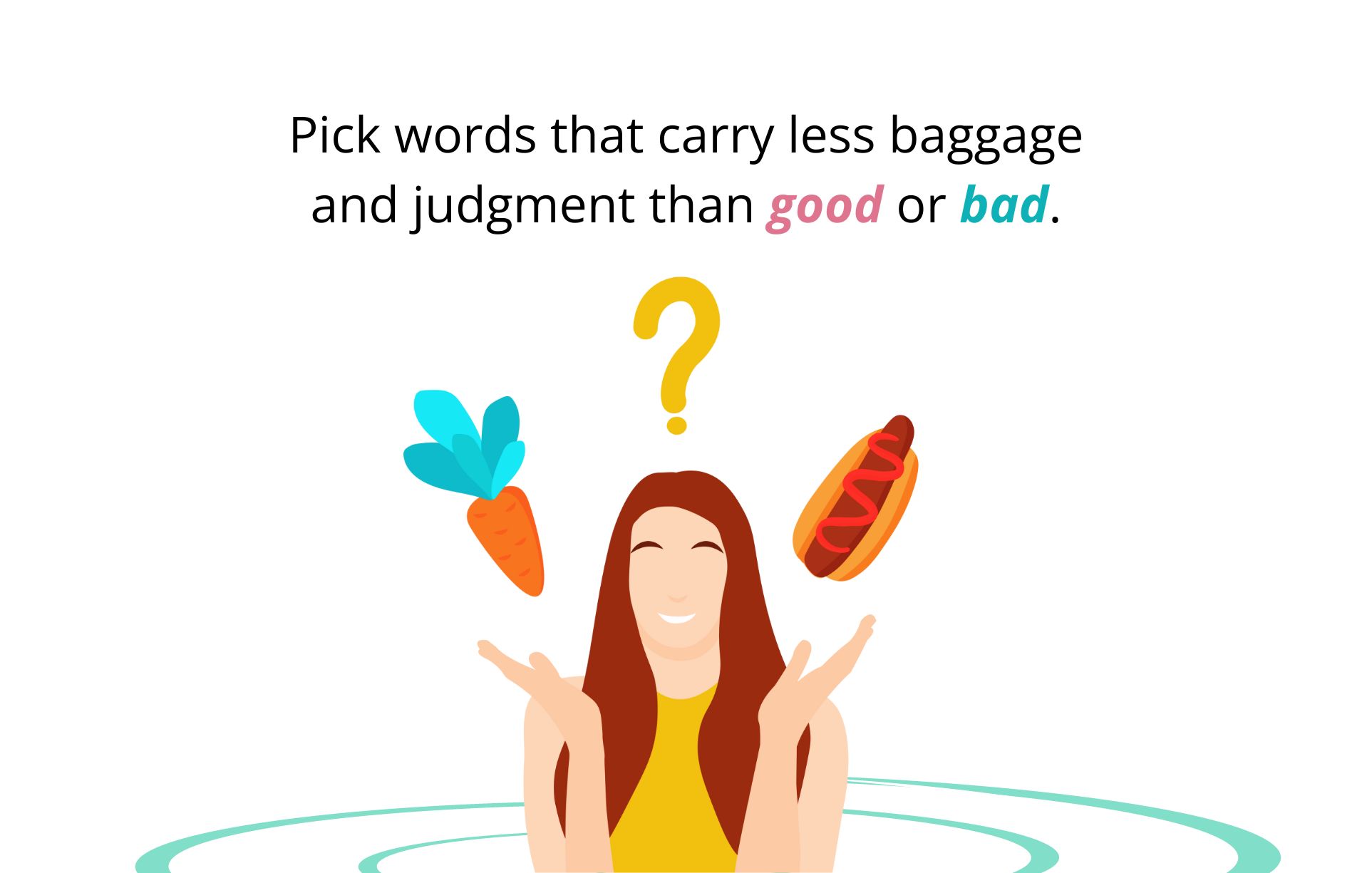
4. Practice Compassion
Usually, after a binge, we think we can hate ourselves into change.
We blame and criticize ourselves, drowning in the guilt we feel for overeating. But what if you practiced compassion instead? When you can lean first into a mindset of curiosity, it helps lead into compassion.
We can get curious about what we’re doing and why.
Instead of our criticism leading into another diet, then an inevitable binge, we can use curiosity to move into awareness of habits and patterns, which is the first step towards change!
If you eat something you didn’t have planned, go to food over a stressor or something emotional, or eat more than you intended, see if you can get curious first to help practice compassion! Because it’s always THIS that leads to change, never punishment. ♥️♥️♥️

See if you can get curious first to help practice compassion! Because it’s always THIS that leads to change, never punishment.
5. Ask “Why Did I Binge”?
Instead of beating yourself up, ask, “What happened that led me into a binge?”
If we can use our binges as lessons, they hold powerful messages. Learning what sent us to the food can be so helpful in working on the “real” issue (vs just trying to start a diet to get back on track!)
Here are some helpful questions:
- Did I go too long without eating?
- Did I eat enough protein?
- How much allowing vs not allowing am I doing?
- Were my meals satisfying?
- Was it an emotional need?
- How was I feeling all day before I binged?
- What situation, person or feeling did I want to run from?
Overcoming Low Self-Esteem in the Restrict-Binge Cycle
Low self-esteem often fuels the restrict-binge cycle, as we turn to food to cope with negative feelings about ourselves.
By focusing on self-compassion and practicing self-acceptance, we can break free from this cycle and begin to build a healthier relationship with our bodies and food.
How to Stop Thinking About Food Constantly
Constant thoughts about food are often a result of restrictive dieting and the fear of eating “wrong.”
By allowing ourselves to eat freely and mindfully, we can diminish these obsessive thoughts and begin to listen to our body’s natural hunger and fullness cues.
Moving Forward: Life Beyond the Binge and Restrict Cycle
Moving beyond the binge and restrict cycle is about embracing a balanced and sustainable approach to eating and self-care.
By focusing on intuitive eating, self-compassion, and holistic well-being, you can cultivate a positive relationship with food and your body. It can be scary to imagine life without this cycle–I know, this was one of my biggest fears! But now my life looks completely different. My weight is stable, my food is normal and I’m living a life true to myself.
Tips on How to Start Enjoying Food Again
To start enjoying food again, shift your mindset from viewing food as the enemy to embracing it as a source of nourishment and pleasure.
Experiment with new recipes, savor each bite, and give yourself permission to eat without guilt, which can transform your relationship with food.
Why It May Be Time to Stop Dieting for Good
Dieting often leads to a cycle of deprivation and overindulgence, making it harder to maintain a healthy relationship with food.
Embracing intuitive eating and rejecting diet culture can free you from this harmful pattern, allowing you to focus on holistic well-being rather than weight control.
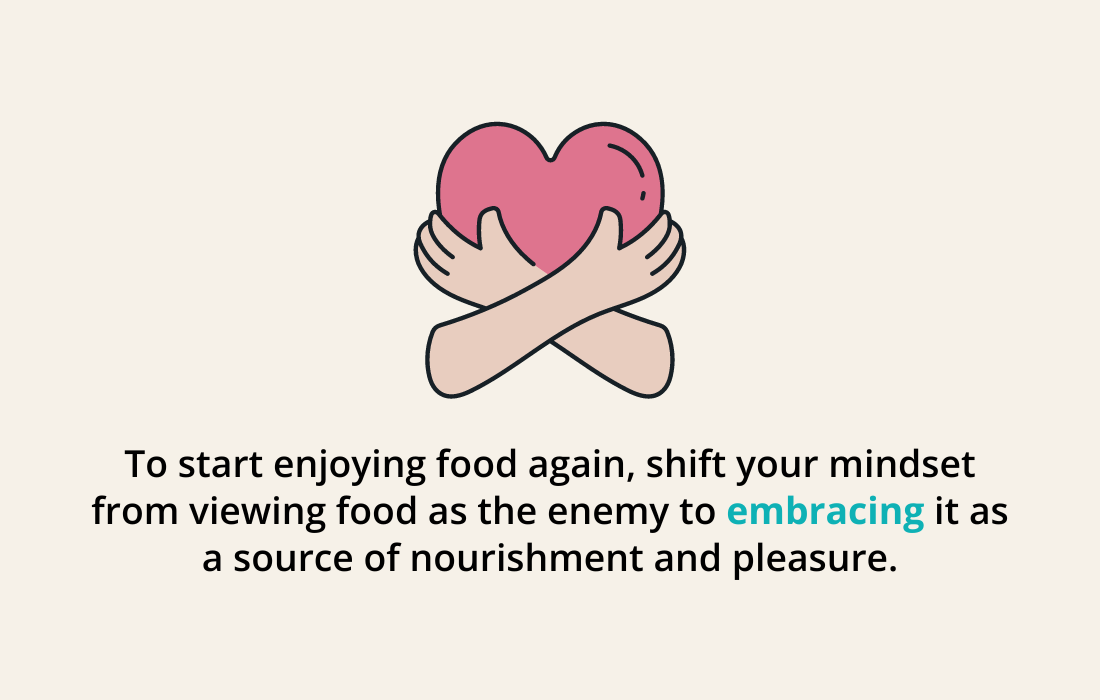
Common Questions About the Binge and Restrict Cycle
How does the binge-restrict cycle impact mental health?
The binge-restrict cycle impacts mental health by increasing anxiety, depression, and feelings of guilt and shame around food.
How can I recognize the signs of a binge cycle in my eating habits?
You can recognize the signs of a binge cycle in your eating habits by noting episodes of eating large amounts of food quickly (that feels compulsive) and feeling a loss of control.
How does restricting food lead to binge-eating episodes?
Restricting food leads to binge-eating episodes by creating intense physical and psychological cravings that eventually result in overeating.
Can low self-esteem contribute to the binge-restrict cycle?
Low self-esteem can contribute to the binge-restrict cycle by driving individuals to use food as a way to cope with negative critical thoughts of themselves.
What are some effective ways to stop thinking about food?
Some effective ways to stop thinking about food include practicing mindful eating, working to let go of food rules so nothing is off limits, and addressing underlying emotional issues.
Is it important to stop dieting as a step toward recovering from binge eating and the binge-restrict cycle?
It is important to stop dieting as a step toward recovering from binge eating and the binge-restrict cycle to establish a healthier, more sustainable relationship with food.
What types of confidential support are available for those struggling with binge eating?
Confidential support for those struggling with binge eating includes therapy, support groups, coaching, helplines, and online resources that offer privacy and professional guidance.
Where can I find confidential support through an online chat, therapist or food coach?
You can find confidential support through an online chat, therapist, or food coach on websites specializing in eating disorder recovery, mental health platforms, and professional services.
Can I call a therapist online to get help if struggling with binge eating?
Yes, you can call a therapist online to get help if struggling with binge eating, as many therapists offer virtual sessions that provide accessible and convenient support.
What should I know before I text or call a helpline for eating disorder support?
Before you text or call a helpline for eating disorder support, know that these services are confidential, offer immediate assistance, and can connect you with resources and professionals specialized in eating disorder recovery.
Get the Normal Eater’s Newsletter
Join 8000+ women who are overcoming overeating, binge eating, and breaking up with dieting forever. Get Jenn’s inspiring and actionable weekly newsletter with the latest posts, podcasts, and tips on how to love your body, find food freedom, and lose weight holistically.
Related Articles about Overcoming Binge Eating
⚪ How to Stop Binge Eating at Night
⚪ I Stopped Binge Eating — Here’s How I Did It
Work with an Emotional Eating & Holistic Nutrition Coach
Overcome Bingeing and Emotional Eating, and Break Up with Yo-yo Dieting
Working with an emotional eating coach and holistic nutritionist can help you get free from the frustrating binge and restrict cycle and stop yo-yo dieting.
You don’t have to be obsessed with food or have a million rules around eating to find your natural weight and learn to love your body. Ready to actually see a lasting change and experience true freedom?
Click here to schedule a 20-minute introductory coaching call.
About the Author:
Jenn Hand has been helping women like you become normal eaters since 2015.
She’s worked with thousands of women, helping them to balance their bodies, end bingeing, stop obsessing over food, and start feeling amazing again. As a board-certified health coach and holistic nutritionist, Jenn knows how to support you in making real positive changes that last.
Her articles have been published on Mind Body Green, Tiny Buddha, Thrive Global and other local and global media platforms. She’s the author of How to Be a Normal Eater and the creator of The Normal Eater’s Club program. Listen to Jenn’s advice and tips on the Cake Doesn’t Count Podcast, or read more of her articles for free on the Food Freedom Blog.
Learn more about private coaching with Jenn here >

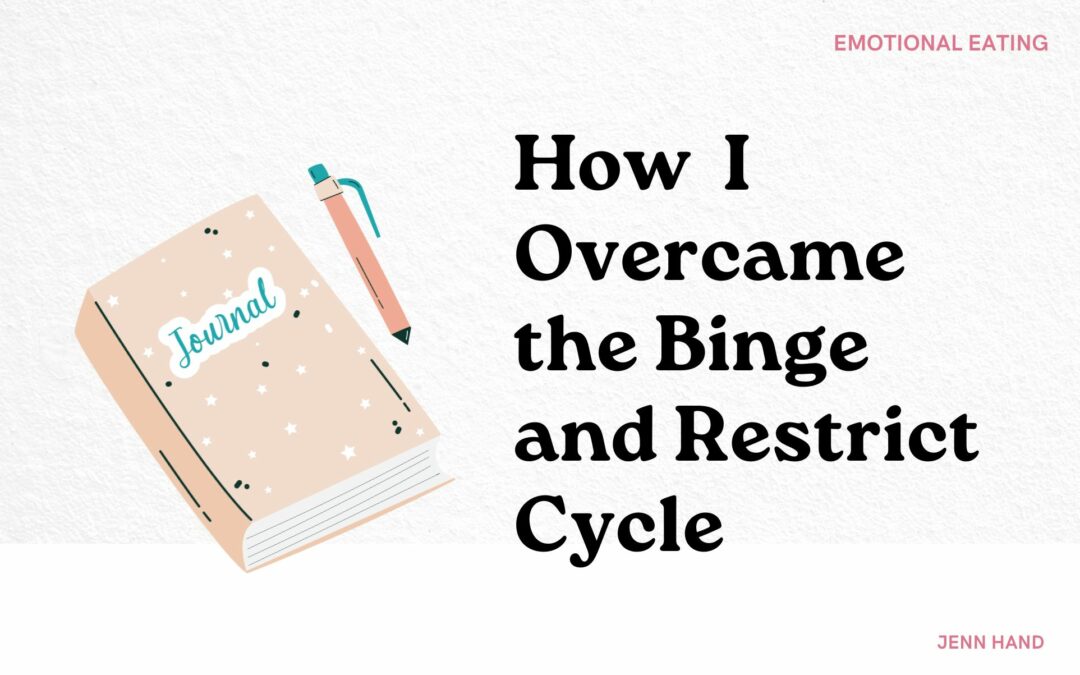
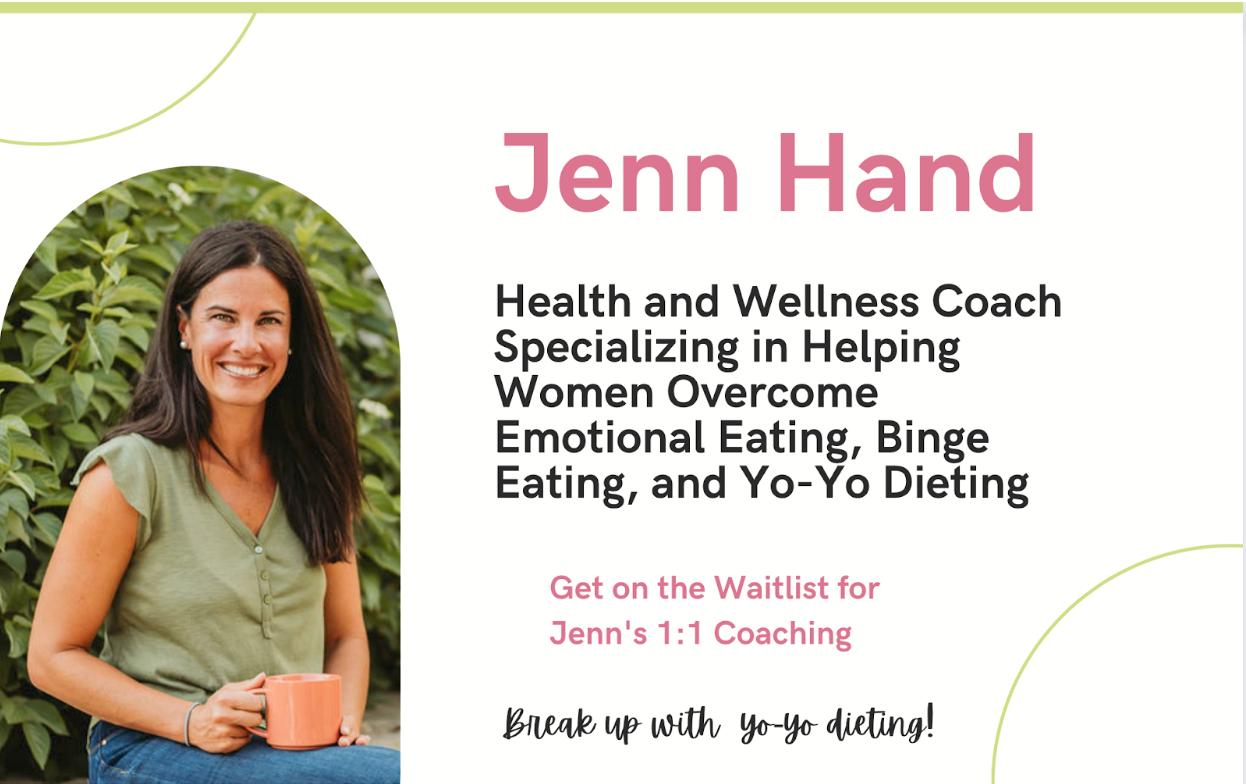




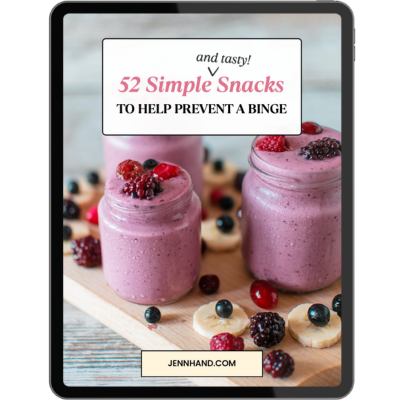
Hi, Jenn. Until recently, I had a terrible time understanding why I overate. I wasn’t an emotional eater. The advice to stop eating when I started to feel full didn’t help because I never felt full. Then I had DNA testing done and found out that I am genetically wired to NOT feel full AND to occasionally binge because my brain gets hung up in the pleasure and can’t quit. This was actually good news, because it enabled me to stop beating myself up for being weak and lacking moral fiber. Now that I know my issues are physical rather than mental or emotional, I have finally been able to be gentle with myself and focus on techniques like yours instead of being caught in a cycle of self-blame. The relief has been incredible; I didn’t even realize how hard I was on myself. Thank you for always including reminders to be good to ourselves in your suggestions 🙂
Thanks for sharing this, Beth. I think it’s important, because this “issue” can be so complex! The self-blame part can be so crushing, so that’s wonderful you’ve been able to let go of that 🙂